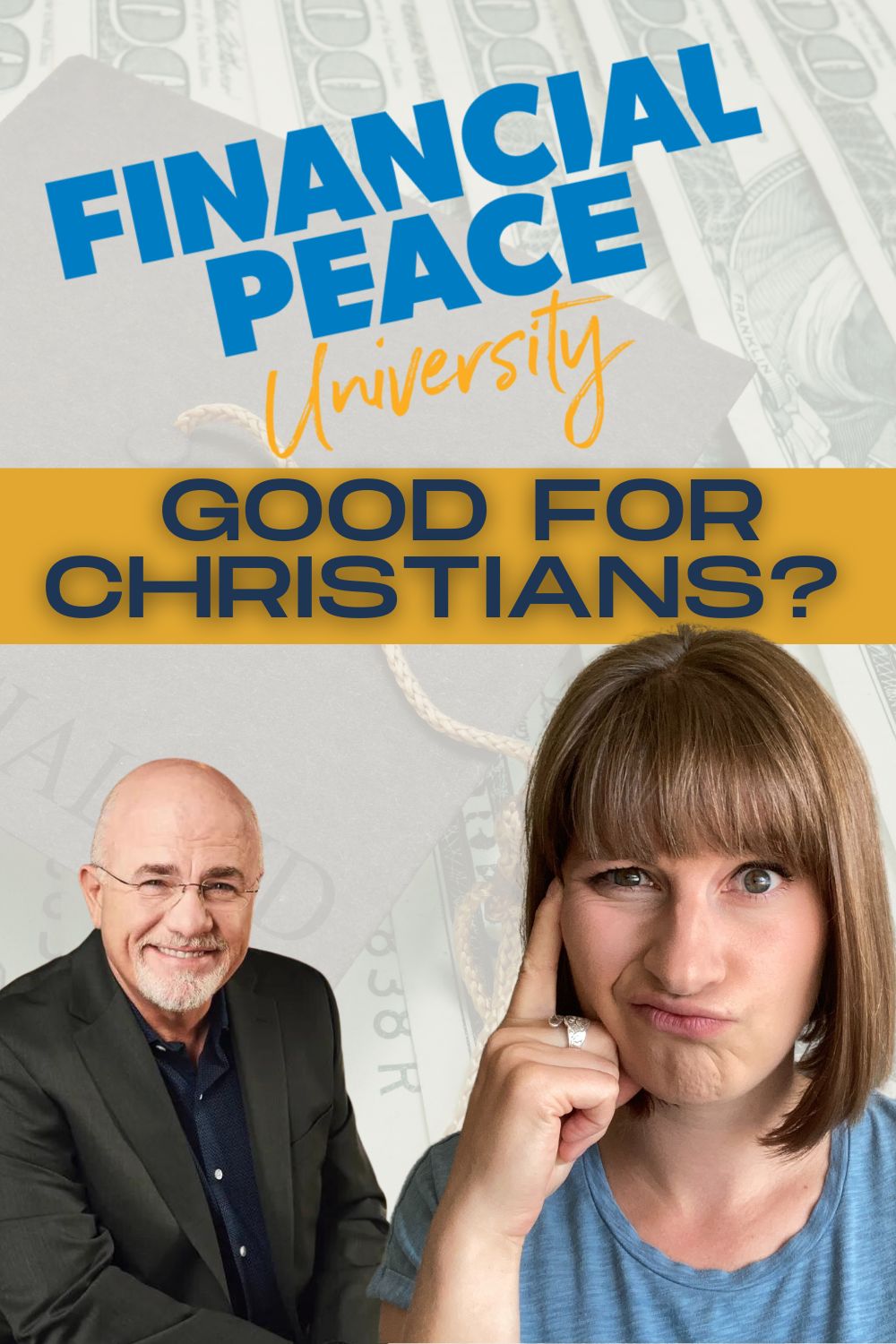Is Financial Peace University The Best Money Management Solution For Christians?
First off, I have to say that Dave Ramsey and Financial Peace University (FPU) have definitely helped a lot of people achieve a ton with their finances!
But is it the right solution for Christians when it comes to learning about Biblical Money Management?
Hey there, I’m Katie Jones. I’m a certified Christian financial counselor which is just a fancy way of saying I help believers learn how to incorporate their faith into their finances. My passion is to help you understand how the gospel changes everything and in particular the way that you manage your money!
So that brings me to the topic at hand – is Financial Peace University the right solution for Christians who are looking for help with their finances? I will go over some of the things I like about FPU and then I’ll share with you a few of the things I don’t agree with.
Disclaimer – I took FPU back in 2020. Right when the pandemic hit, they were offering a free trial of FPU so I sped through the entire program, watching all the videos and soaking in all that they taught before I had to pay for the program.
Some things may have changed in the last few years since I took it – one of the big things being that Chris Hogan is no longer a Ramsey Personality. (Interestingly enough it seems that his departure was due to not holding up to the Biblical standards for marital fidelity)

Things I Agree With In Financial Peace University
- General Financial Wisdom Throughout the Program
In general, I agree with a lot of the financial wisdom that they share throughout FPU such as building up emergency funds, having a budget, saving money, paying off debt, and investing for retirement. Each of these are things that I help my own coaching clients with. They are lessons we can also pull from the Bible, and they are also money lessons that pretty much any financial professional would agree with.
- Where to put your Emergency Fund (money market accounts)
- Dave suggests looking at either a Local Bank MMA, Online Bank MMA, Or Investment MMA. I think either is fine, but I prefer an online bank MMA because it gets you a generally higher interest rate, yet doesn’t put the money at risk.
- I agree with a life of FPU’s views on Insurance
- For example, life insurance – buying term rather than whole life.
- I also agree not to get dental or vision insurance (generally for those who are healthy/low-risk)
- I also agree that once you have a fully funded emergency fund, you should change your insurance policies to have higher deductibles. Since you will have the cash to cover yourself in the case that you have a car accident. We did this with our auto insurance and a couple of years later I got in a car accident that totaled my car, but I had no worries about paying the deductible because we had a nice cushy emergency fund that could handle it.
- Plus if you have a high deductible health insurance plan you have the benefit of opening up a HSA
- I also agree with their overall philosophy of thinking about how to live life differently.
- For example, in baby step 3 they have a small lesson on contentment where they share that the cure for comparisons is contentment and that gratitude will lead you to contentment. I definitely agree with this lesson! I love that they took the time to share that.
- They also talk about things like how college is a blessing and not something we are entitled to. And that when thinking about where to send kids to college we shouldn’t just pick the most expensive and prestigious, but rather something more affordable and apply for college scholarships to help make it even more affordable.
- Toward the end of FPU, they even have a whole lesson teaching individuals how to spot marketing schemes and how to be cautious not to let them convince you that you NEED something. I really enjoy this lesson.
- And the lesson about paying off your home early. There’s a lot of controversy on whether or not to actually pay it off early, but I live in the camp that says – if you can live debt-free why wouldn’t you? Sure there are tax benefits for having a mortgage but most of the time the tax benefits don’t outweigh the benefits of saving on interest when paying the mortgage off. But I personally think that the concept of not owing anything to anyone sounds much nicer.
- In general, I agree that making changes to your finances does take focus and commitment.
- FPU shares examples of how we can do this by selling things we don’t use anymore and cutting back on nonsense spending. This just makes sense – especially if you want to prioritize other things within your finances. But in a little, I’ll share why I don’t totally agree with the way they teach intensity.
Things I Don’t Agree With In Financial Peace University
- Emergency Fund Timing (he says first $1,000, then become debt-free, then fully fund emergency fund)
- Depending on how much debt you have, this plan could take YEARS and to go that long without a fully funded emergency fund is just too risky. I believe a FULL emergency fund should come first. Or at least should be a priority while you pay off your debt too.
- If you have a big emergency happen while you are paying of your debt having a fully funded emergency fund will help you from falling further into debt!
- Also, $1,000 barely covers 1 month’s rent in many places across the US, and it definitely doesn’t cover paying off debt each month, and it barely would cover a minor car repair.
- I suggest starting with $1,500 as your first goal and then building up to between 3-6 months. (Don’t know how much to save? This is something I go over in my workshop on how to build a Kingdom-Oriented Money Management System – you can take the class for FREE by registering for it here.
- One Size Fits All
- In the FPU workbook, they say, “Here’s a pro tip: Don’t get ahead of yourself and work the steps out of order or do the plan “ish.” No matter how tempting it is, don’t try to pay off debt while still funding your 401(k) or buy a home while you still have student loans breathing down your neck—that split focus isn’t going to get the job done. For this to really work, you have to follow the steps in order. Trust us. It’s called a “proven plan” for a reason.”
- To be clear though Dave Ramsey stands firm about this belief specifically for the first 3 baby steps. Once you get to steps 4, 5, and 6 he has a short lesson on “in order, but at the same time” which is more of the philosophy I agree with. Definitely prioritize certain goals, but you can work on multiple at the same time. So put a larger amount of savings toward your emergency fund and a smaller amount toward paying off debt each month.
- Credit Cards
- Everyone likes to ask me what I think about Dave Ramesey’s view on credit cards. Well, I don’t 100% agree with him, but I also don’t 100% disagree with him. Credit cards can be beneficial if used properly. If you ever hold a balance on your credit card and pay interest on the money you are using, then yes, cut it up until you can learn to spend only the money you already have in your account. If you want to learn more about what the bible says about credit cards check out this video I made about it.

Why Financial Peace University Isn’t The Best Money Solution for Christians
- It is subtly promoting the Prosperity Gospel.
While no Christian would openly admit that they fall prey to the Prosperity Gospel, I will be the first to admit that until I really understood what it REALLY was, I was hopelessly under its charm for many years.
I like the way that Author and Pastor Dean Inserra describes it in his book “Getting Over Yourself – Trading-Belive-In-Yourself Religion for Christ-Centered Christianity. He says, “In new prosperity churches, Christian terminology is often repackaged in a way that redirects congregants toward their own stories and away from self-denial, picking a cross, and living to magnify Jesus above all. “
He goes on to say that “this is the Disney-fication of the Bible: when you believe in Jesus, He makes all your dreams come true. Yes, Jesus saves you from your sins, but He’s also like the genie from Aladdin. “
In essence, Jesus did not come to redeem you of your sins in order for you to #liveyourbestlife.
So back to my point, Financial Peace University is subtly teaching believers that the Gospel exists solely to help us accomplish our own financial goals. Rather than helping believers understand how our finances should help to accomplish God’s Kingdom-Goals here on earth.
- Example 1. On page 35 of the workbook, they list prayer as one of the ways you can get out of debt. Now, I’m not saying prayer DOESN’T work, but rather I’m saying prayer isn’t a currency you pay to God in order to receive the things you desire, such as debt freedom. Pray for debt freedom, ask God for supernatural ways of paying it all off, but at the same time, ask for your heart to be transformed so you aren’t so preoccupied with the debt you have. Pray that you might find contentment the next time you feel the need to ring up a purchase on your credit card. Learn more about praying for your finances here.
- If that isn’t a good enough example for you check out page 61 in their workbook which is where Baby Step 4 begins (which is the step about investing in your retirement savings) this page quotes Proverbs 21:5 which says God planning and hard work lead to prosperity, but hasty shortcuts lead to poverty.
- Gazelle Intensity
This brings me to my next reason why I don’t believe that Financial Peace University is the right money management solution for Christians and that is Dave’s concept of Gazelle Intensity which he pulls from Proverbs 6:1-7
Gazelle intensity is the term Dave Ramsey came up with to describe the speed and intensity you should have when paying off debt. It’s all about running away from debt—like your life depends on it.
Dave coined the phrase after reading Proverbs 6:4–5, “Give no sleep to your eyes, nor slumber to your eyelids. Deliver yourself like a gazelle from the hand of the hunter, and like a bird from the hand of the fowler.”
Dave literally talks about running from debt as if your life depended on it. As if the debt is going to swallow you whole if you don’t eliminate it immediately!
Don’t get me wrong, I HATE debt too. It does often feel like it’s going to eat us alive. Most of the clients I have worked with have some form of debt be it student loans, auto loans, credit card debt, or something else and that is one of the main reasons they choose to work with a money coach – so they can pay it all off! And I always help them develop a plan to pay it off.
But, the part I don’t agree with here is the implications of making our financial goals our number one priority. Your financial goals should never come before God’s calling on your life.
Focusing with “gazelle intensity” on your financial goals is also NOT sustainable. It is ultimately not having a Kingdom focus for your money management system. Often God points us in one direction and redirects us.
Not only that, but as believers, we do have one thing that we should be fleeing from with gazelle intensity and that is SIN. That is the real thing that will come and eat our souls alive!
- To follow up with that point, FPU doesn’t centralize the Gospel.
In one of Dave Ramsey’s radio shows he is quoted as saying that FPU “is not like Jesus Jesus Jesus every other thing, but it is what the Christian Bible says about money. I quote a lot from Proverbs, but it’s not a Bible study”
I can definitely attest to the fact that there are plenty of Bible verses throughout the workbook and teachings. The workbook references them quite often. But it’s not enough to just sprinkle some Bible verses here and there and call it a “Gospel-Centered Money Management Solution.”
By copying and pasting the most helpful Bible verses, FPU is stripping the Bible down to a manual of principles.
According to author and pastor Skye Jethani, this kind of living is more along the lives of living a life, “From God” or even a life “Over God” Life from God makes us simply consumers, where God gives and we take. Living a life Over God is like looking at the Bible as an instruction manual full of principles where our outcomes depend on how closely we follow the instructions.
For more on this check out his book With: Reimagining the Way You Relate to God
There’s a reason money is talked about SO much in the Bible (over 2,300 Bible verses mention money in some way shape, or form) Why? Because money gives us a form of power. A power that, if we get carried away with it, will lead us to live independently from God.
I’m not saying having lots of money is bad. It is still needed to make ministry happen. In fact, Jesus’ own ministry was funded by wealthy women. (Luke 8:1-3)
What I AM saying is that only focusing on the few Bible verses here and there that mention money doesn’t give us the whole picture. We are missing the most important part of money management – THE PURPOSE
Take for example the Bible verse here on page 16 of the FPU workbook – Luke 14:28. This is the quintessential verse about budgeting. Yes, we can use it to interpret some practical wisdom that budget is important, I definitely agree with that! BUT much deeper than that, this verse is saying the COST to follow Jesus is GREAT. Because right before this verse, Jesus teaches about what it means to pick up our crosses to follow him.
Jesus mentions hating our parents, spouses, children, and siblings in vs 26 and continues later on in vs 33 to say we need to give up EVERYTHING to follow him. The heading in my Bible for this section of scripture literally says “The Cost of Being a Disciple”
So yes, we can definitely pull some practical money advice from this one passage, but if we only focus on that, we lose out on the bigger picture Jesus is trying to paint with this parable. We may even miss out on the fact that he may be calling us to literally give up everything, including that dream to become debt-free in order to focus our attention on something much more valuable – HIM.
- Giving Comes Last
Dave’s philosophy on giving is “When you live like no one else, LATER, you can live and give like no one else.”
I like Dave’s concept about giving like no one else, but why wait till later?
Dave mentions that God owns it all and we are just managers of his money and so we are called to be generous like he is generous. All fantastic lessons!!
But they just come all the way in lesson 9….. Literally, the LAST lesson inside of FPU is finally about how we are money managers and should spend money like God would want us to.
What’s wrong with this? The fact that it is last…
*I will mention that in lesson 1 when there are examples of how to budget they do include a giving line item as the first thing on the expense list, and it does reflect giving 10% of your income as a gift. However, they don’t actually address giving 10% until lesson 9 where they finally tell you that you should be giving a little bit during each step of the process. But the FPU personalities always say DO NOT SKIP AHEAD so you don’t actually learn about being generous the whole journey until you’re at the end…
If we want our faith to be centralized in our finances we need to understand first and foremost that the money belongs to God and therefore consult him on how to spend it.
He even says that we are the happiest and most fulfilled when serving and giving and that the “Peace” in financial peace comes from outrageous generosity. I 100% agree! But why not start living a generous life NOW?
Just like the poor widow did with her 2 coins. Jesus teaches his disciples that the woman gave more than the rich because she gave all she had rather than waiting until she was super wealthy.
The difference here is how we define outrageous. The world says to be “Outrageously generous” we need to have lots of money. But God says to be outrageously generous we need to make big sacrifices.
Who Financial Peace Is Best For
Luke-warm Christians: Maybe you consider yourself a Christian and you don’t find a problem with the fact that FPU doesn’t centralize the Gospel in its teachings. That’s fine, but I do want to warn you that if you simply focus on your financial health just for the sake of financial health, and ultimately don’t allow the Gospel to really transform your finances, you inevitably end up feeling money pains later down the road.
Trust me, I’ve been there and done that. I set aside all my other priorities while working on my goal to become debt-free and by the time I actually accomplished that goal, I felt like a shell of who I knew God wanted me to be. We cannot serve two masters. One will always take first place while the other will be stuck on the sidelines
I know it might sound a bit “crazy” to be held to such high standards with our finances. But remember that the money you possess is not your own.
But remember the Lord your God, for it is he who gives you the ability to produce wealth, and so confirms his covenant, which he swore to your ancestors, as it is today.
Deut 8:18
It’s funny because FPU actually uses this verse when teaching about investing our money.
My friend, do not allow the enemy to convince you that your faith should be kept out of your finances. The Gospel has the redemptive power to transform every aspect of your life into an act of worship! By keeping your faith on the sidelines of your money decisions, you are limiting the power it can really have in helping you live a more abundant life dedicated to Christ.
Non Believers: I believe Financial Peace University should not cease to exist because there are people out there who I think that FPU is created for, and those people are non-believers. They get a taste of the Gospel and it at least exposes them to Biblical Principles. I think it is a great way to get non-believers in front of the Bible in a non-threatening way.
Ready to transform your financial journey through faith-based guidance? Book an empowering call with Katie Jones, a Certified Christian Financial Counselor, today and pave the way for abundance and blessings in your life!




FPU isnt perfect – no curriculum is. The $1,000 emergency fund is designed to start a habit of saving. It’s not about the $$ amt.
All other christian financial curriculum and stewardship Bible studies are so dated it’s sad. Of course the Biblical teachings are timeless but presentations are old — checkbooks, no apps for tracking $$. I’m writing my own and will start with the heart.